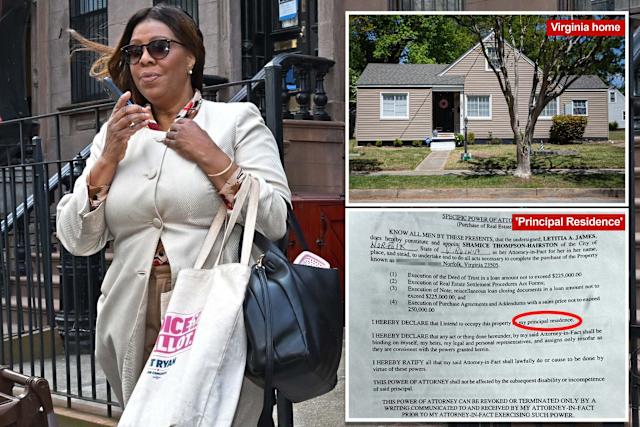If you thought Letitia James’s mortgage mess was a single bad decision with a sympathetic backstory, forensic accountant Sam Antar would like a word. In a meticulous roundup, Antar says James’s issues don’t start with one Norfolk house or one fudged “primary residence.” He tracks many separate instances of alleged mortgage/occupancy misrepresentations stretching back to 1983—a through-line of “owner-occupied” boxes ticked when the reality, he argues, often looked like rentals, second homes, or something that didn’t match the paperwork at all.
This is the part where defenders typically shout “old news” or “clerical error.” But Antar isn’t waving screenshots from partisan influencers; he’s walking readers through filings and lender docs the way a CPA stalks a P&L—entry by entry, loan by loan. And his point is bigger than any single affidavit: if the state’s top law-enforcement officer has repeatedly secured favorable terms based on owner-occupied claims that weren’t true, that’s not an “oops.” That’s a business model.
Remember the narrative arc we’ve seen for months: James the scourge of fraudsters, James the indispensable democracy-defender, James the headline machine. Now set that brand next to a decades-long pattern of “primary residence” alchemy and ask the only question that matters: If this were a landlord, banker, or—let’s be honest—a political enemy, would Letitia James give them the benefit of the doubt? Or would she call it what she calls it in every press conference: fraud.
The newest twist in the James family saga reads like rejected courtroom fan-fiction. A recent report from The Gateway Pundit alleges that the entire “primary residence” defense surrounding James’s Brooklyn home sits atop a foundation poured by illegal corner-cutting. According to the piece, Letitia engineered a fake marriage to her own father to secure favorable mortgage terms—a pattern she apparently internalized and modernized. James has used paperwork as vows: each affidavit, license, and sworn declaration recited with all the sincerity of a campaign promise.
In a sane world, this would be a family embarrassment left to gossip columns. In New York’s justice ecosystem, it’s apparently the prototype for governance. The alleged fake marriage didn’t just fund a house—it furnished the moral architecture for decades of selective enforcement and virtue-signaling. When your personal ethics start in a title-fraud ceremony, it’s not surprising that “public service” ends up looking like a timeshare scam with a press office.
Antar also tags something the blue-check press would prefer you ignore: the laundering effect. If gatekeeper outlets and lawfare-adjacent pundits can frame this as “nothing here, move along,” they don’t have to reckon with the ugly possibility that James built equity and interest-rate advantages on claims ordinary borrowers would be punished for. That’s not a “right-wing take.” That’s a fairness take.
And yes, this folds neatly into the “rules for thee” dynamic we’ve been documenting. When the same official who pours accelerant on “fraud” cases turns out to be—per Antar’s receipts—playing Calvinball with mortgage terms since the Reagan era, voters start to see why the word selective keeps showing up next to justice. It’s not the one Norfolk “second home” rider; it’s the drumbeat. It’s the pattern.
Cue the inevitable replies:
- This is ancient history. Great—so is character. A pattern that runs from 1983 through the 2000s and into the 2010s is exactly the kind of thing prosecutors call modus operandi.
- Everyone stretches a little on mortgage apps. Everyone doesn’t run a statewide law office that prosecutes people for doing exactly that.
- It’s misogyny to question her. No. It’s accountability to question power—especially the power that lectures you about yours.
If New York’s attorney general truly believes her own speeches about “no one being above the law,” the remedy isn’t more MSNBC nod-alongs or press-release thunder. It’s daylight. Publish the documents; explain the discrepancies; show where Antar is wrong on the merits. If she can do that, great. If she can’t, the story writes itself: the top cop of New York built a public career out of prosecutions that mirror her private shortcuts.
A final note on tone: none of this needs a conspiracy theory. It needs arithmetic. Mortgages are math problems with signatures. Antar tallies the math and matches it to the signatures. If the answers don’t reconcile, the burden isn’t on the spreadsheet. It’s on the signer.
Citations
- White Collar Fraud – “The Anatomy of a Cover-Up: How MSNBC and Lawfare Whitewash Letitia James’s 20-Year Mortgage Fraud Pattern” (October 6, 2025)
- The Gateway Pundit – “How Letitia James’s Fake Marriage to Her Dad Sparked Decades of Fraud” (October 20, 2025)


Pingback: ERIC SWALWELL: NEVER SAW THE SPY BEHIND HIM - #TCOT Reporter